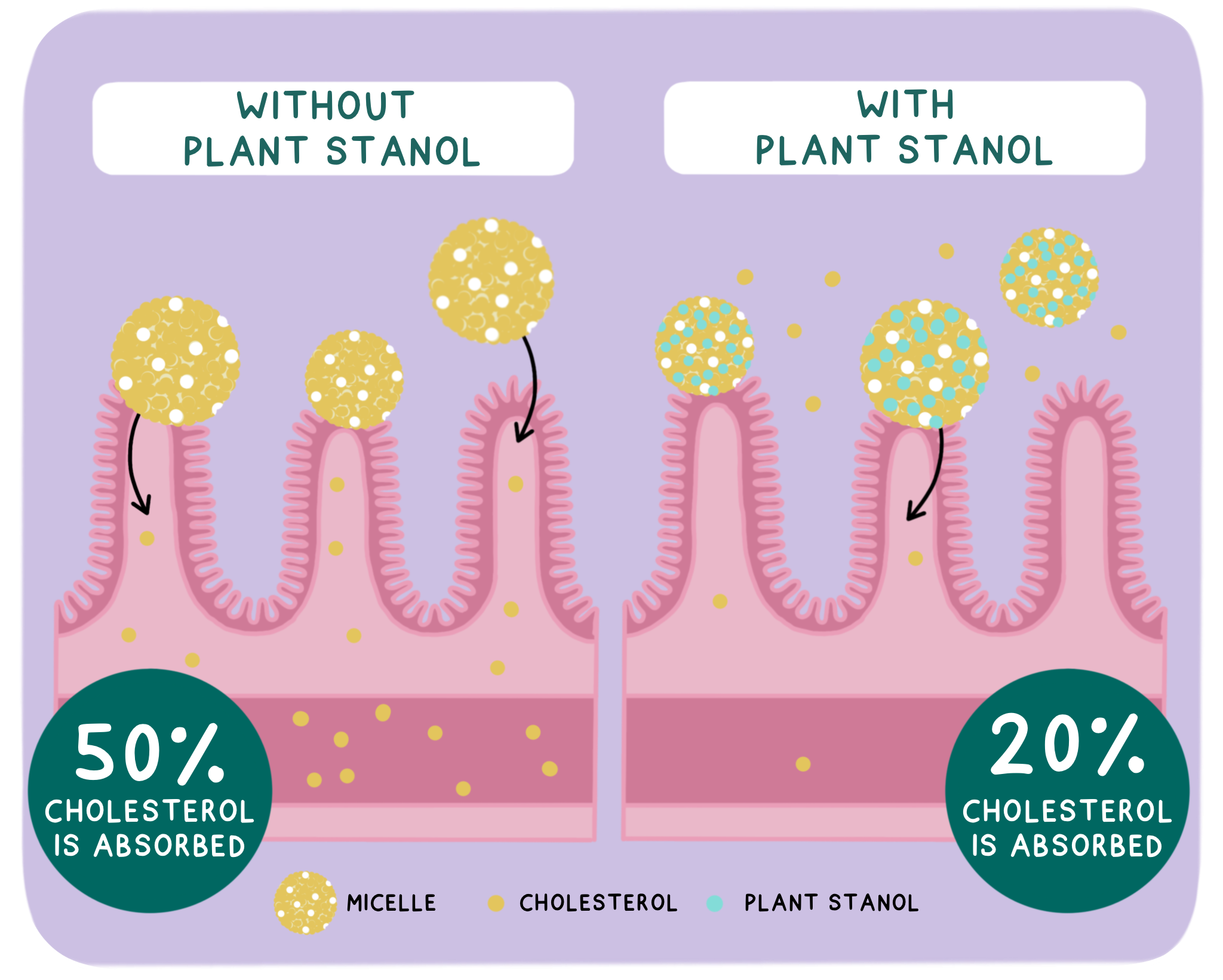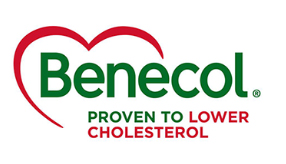Written in collaboration with the healthcare professional support team at Benecol.
Lowering cholesterol is an important aspect to consider when looking after our heart health, no matter what age, and so what better time to learn more about the science behind how plant stanols and sterols lower cholesterol than now, during National Cholesterol Month!
More people die from cardiovascular disease (CVD) worldwide than from any other cause(1). Of which, coronary heart disease (CHD) is the biggest culprit, due to the build-up of fatty deposits in the blood vessels (atherosclerosis) causing blockages and preventing blood supply to the heart or brain (heart attack or stroke)(2). Elevated blood cholesterol, or hyperlipidaemia, is a major modifiable risk factor for CHD and is widely studied.
When an individual is diagnosed with high cholesterol by their healthcare professional, many people may consider turning to functional food products with added plant stanols to help them achieve their cholesterol-lowering goals. However, some people remain understandably sceptical of such products – nutritional science can be complicated at the best of times! So in honour of National Cholesterol Month, we’ve summarised the science behind why, and how, products with added plant stanols do actually work! As well as where you can access a toolkit of scientific resources to use at your disposal with your current and future patients and clients.
What are plant stanols and where can I find them?
Plant stanols are structural components of plant cells and are naturally found in a range of foods. The most common dietary sources of plant stanols are cereals, mainly wheat and rye(3,4) Daily intake of plant stanols from a normal diet is about 20–30 mg per day(5,6), which unfortunately is nowhere near enough to benefit from their cholesterol-lowering effects(7). This is where products with added plant stanols come into play, as they enable an optimal daily amount of plant stanols to enter the body in an easy and convenient way.
However, it isn’t as simple as just including plant stanols in their free form into these types of products. Plant stanols in their free form tend to form crystals that will not lower cholesterol optimally and end up feeling granular in the mouth. Therefore, there are a number of technical limitations to consider in order to create these products.
So, to ensure these products can provide an optimal daily intake of plant stanols in a palatable form, a process to esterify plant stanols with vegetable oil fatty acids was developed. Adding esterified plant stanols to a food product does not affect its taste or mouthfeel, and most importantly, esterified plant stanols lower cholesterol effectively(8,9).
How does plant stanol ester lower cholesterol?
Plant stanol ester lowers both blood total and low-density lipoprotein (LDL) cholesterol by partly inhibiting the absorption of cholesterol in the small intestine. High-density lipoprotein (HDL) cholesterol concentration is not affected(7).
As soon as plant stanol ester reaches the small intestine, it is rapidly hydrolysed to free plant stanols and fatty acids by the pancreatic enzyme cholesterol esterase(10). The free plant stanols can then interfere with cholesterol absorption: due to the structural similarity of plant stanols and cholesterol, plant stanols partially displace cholesterol from mixed micelles, so only the cholesterol that is solubilised in the mixed micelles is available for absorption(11). Consuming plant stanol ester reduces the absorption of both dietary and biliary cholesterol. A daily intake of 2g plant stanols reduces cholesterol absorption by about 50%(12,13).
The fatty acid part of plant stanol ester is absorbed into the body in the same way as other dietary fatty acids are, whereas plant stanols are virtually un-absorbable. Clinical safety markers and adverse effects have been monitored in all plant stanol ester intervention studies and no safety issues have been detected, even in long-term use(14,15).

You can find out more about how plant stanol ester works in this video by Benecol.
When is the best time to consume products with plant stanol ester?
It is recommended to always consume plant stanols with a meal as this ensures the optimal reduction of cholesterol absorption(16). This is because bile solution, containing bile acids and cholesterol, is excreted into the digestive tract following a meal, and approximately two-thirds of the cholesterol entering the digestive tract daily is derived from the bile solution.
Plant stanol ester does not have to be consumed with every meal, consumption once a day is enough for the optimal effect. The cholesterol-lowering effects will be sustained for as long as an individual continues to consume the plant stanol ester daily and in recommended amounts16. Unfortunately, many healthcare professionals are not aware of this and as a result, their patients may not be receiving the optimal cholesterol-lowering effect from plant stanol ester products. Therefore, it is important that healthcare professionals understand how to consume these products properly and communicate this to their patients.
How to get the recommended daily intake of 1.5 – 3g of plant stanols to lower cholesterol from 7 to 12.5%:
- Enjoy a Benecol yogurt drink providing 2g plant stanols with a bowl of porridge
- Spread Benecol light lavishly on your breakfast toast, supplying 0.7g
- Add a serving of Benecol buttery taste spread, which provides 0.7g on a baked potato.
- Have a Benecol yogurt as a healthy evening pudding, which supplies 2g
To maintain the cholesterol-lowering effects, ensure products with added plant stanols are:
- Taken daily
- Taken with food
- Taken beyond 2-3 weeks
Whilst this blog emphasises the unique role of plant stanols and sterols in cholesterol-lowering, there are other factors that can also help lower cholesterol including following a heart-healthy diet rich in vegetables, pulses, fruits, nuts, seeds and wholegrains, and with fewer saturated fats from foods such as butter, red and processed meats, biscuits and cakes. Products containing added plant stanol ester fit into an overall cholesterol-lowering diet, and have been included in HEART UK’s Ultimate Cholesterol Lowering Plan®
Learn more about Benecol® products with added plant stanols by exploring the Benecol digital science hub which includes clinical information, e-learning and lots of useful patient resources here: Benecol Healthcare Professional (HCP) – UK
Written in collaboration with the healthcare professional support team at Benecol.

Disclaimer: This blog has been developed in association with the healthcare professional support team at Benecol. Approval of each sponsor and activity is carefully assessed for suitability on a case by case basis. Sponsorship does not imply any endorsement of the brand by MyNutriWeb, its organisers, its moderators or any participating healthcare professional, or their association. Sponsorship funds are reinvested into the creation and promotion of professional development opportunities on MyNutriWeb.
YOU MAY ALSO BE INTERESTED IN:
Atherosclerosis: not just a man’s disease
Proteins: Getting the balance right for heart & muscle health







very useful for patients I see in outpatient clinic NHS.
Hi. If one Benecol reduces cholesterol up to 10%, would it not be better to take 2 or 3 Benevolent for a better effect?